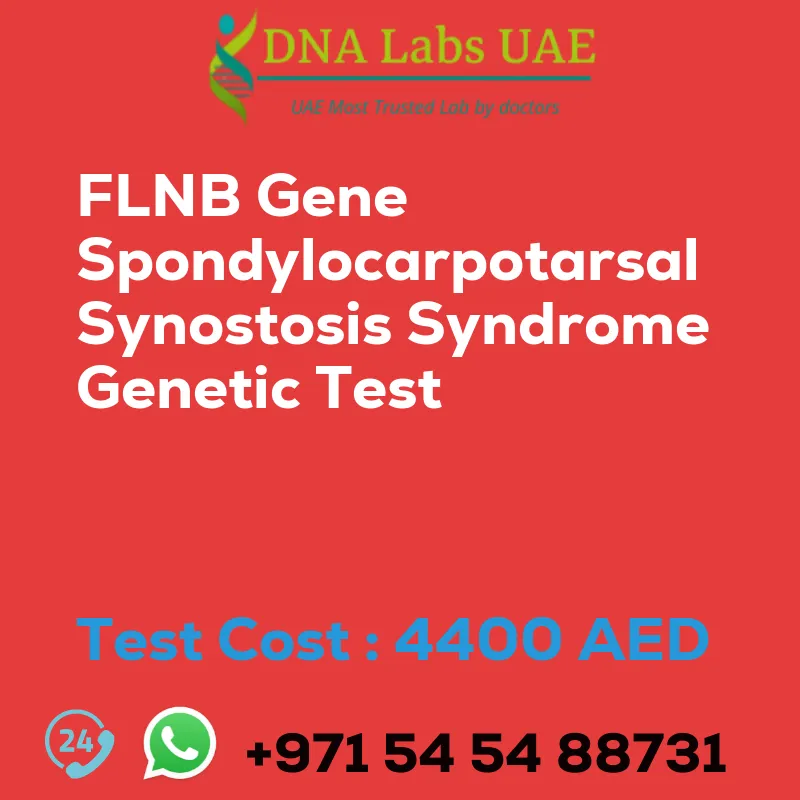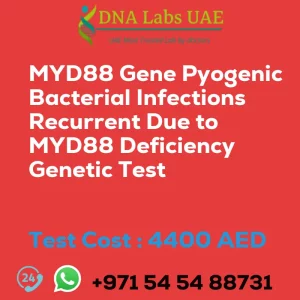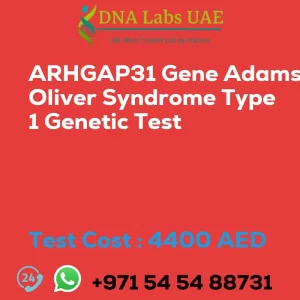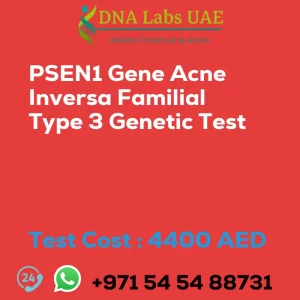FLNB Gene Spondylocarpotarsal synostosis syndrome Genetic Test
Cost: AED 4400.0
Test Name: FLNB Gene Spondylocarpotarsal synostosis syndrome Genetic Test
Components: Blood or Extracted DNA or One drop Blood on FTA Card
Report Delivery: 3 to 4 Weeks
Method: NGS Technology
Test Type: Osteology Dermatology Immunology Disorders
Doctor: Dermatologist
Test Department: Genetics
Pre Test Information: Clinical History of Patient who is going for FLNB Gene Spondylocarpotarsal synostosis syndrome NGS Genetic DNA Test. A Genetic Counselling session to draw a pedigree chart of family members affected with FLNB Gene Spondylocarpotarsal synostosis syndrome NGS Genetic DNA Test gene FLNB
Test Details
The FLNB gene is responsible for producing a protein called filamin B. Mutations in this gene can cause a rare genetic disorder known as spondylocarpotarsal synostosis syndrome (SCT). SCT is characterized by the fusion (synostosis) of certain bones in the spine (spondylo-) and the fusion of certain bones in the hands and feet (carpo- and tarso-). This condition can lead to a range of skeletal abnormalities, including short stature, scoliosis, clubfoot, and abnormal hand and foot positioning.
NGS (Next-Generation Sequencing) genetic testing is a type of genetic testing that allows for the simultaneous analysis of multiple genes or the entire exome (the protein-coding region of the genome). It is a powerful tool for identifying disease-causing mutations in individuals suspected of having genetic disorders. In the case of spondylocarpotarsal synostosis syndrome, NGS genetic testing can be used to identify mutations in the FLNB gene. This can help confirm a diagnosis, guide treatment decisions, and provide important information for genetic counseling and family planning.
It’s important to note that NGS genetic testing may not be available in all healthcare settings and can be costly. It’s typically recommended for individuals with a suspected genetic disorder and can be ordered by a healthcare provider or genetic counselor. The specific testing process may vary depending on the laboratory conducting the test.
| Test Name | FLNB Gene Spondylocarpotarsal synostosis syndrome Genetic Test |
|---|---|
| Components | |
| Price | 4400.0 AED |
| Sample Condition | Blood or Extracted DNA or One drop Blood on FTA Card |
| Report Delivery | 3 to 4 Weeks |
| Method | NGS Technology |
| Test type | Osteology Dermatology Immunology Disorders |
| Doctor | Dermatologist |
| Test Department: | Genetics |
| Pre Test Information | Clinical History of Patient who is going for FLNB Gene Spondylocarpotarsal synostosis syndrome NGS Genetic DNA Test. A Genetic Counselling session to draw a pedigree chart of family members affected with FLNB Gene Spondylocarpotarsal synostosis syndrome NGS Genetic DNA Test gene FLNB |
| Test Details |
The FLNB gene is responsible for producing a protein called filamin B. Mutations in this gene can cause a rare genetic disorder known as spondylocarpotarsal synostosis syndrome (SCT). SCT is characterized by the fusion (synostosis) of certain bones in the spine (spondylo-) and the fusion of certain bones in the hands and feet (carpo- and tarso-). This condition can lead to a range of skeletal abnormalities, including short stature, scoliosis, clubfoot, and abnormal hand and foot positioning. NGS (Next-Generation Sequencing) genetic testing is a type of genetic testing that allows for the simultaneous analysis of multiple genes or the entire exome (the protein-coding region of the genome). It is a powerful tool for identifying disease-causing mutations in individuals suspected of having genetic disorders. In the case of spondylocarpotarsal synostosis syndrome, NGS genetic testing can be used to identify mutations in the FLNB gene. This can help confirm a diagnosis, guide treatment decisions, and provide important information for genetic counseling and family planning. It’s important to note that NGS genetic testing may not be available in all healthcare settings and can be costly. It’s typically recommended for individuals with a suspected genetic disorder and can be ordered by a healthcare provider or genetic counselor. The specific testing process may vary depending on the laboratory conducting the test. |








